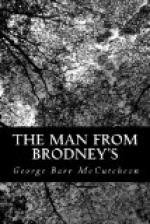Wyckholme held to his agreement with Skaggs by bequeathing his share of the property to him, but it was definitely set forth that at the death of his partner it was to go to Agnes Ruthven, the grandchild—with reservations.
Skaggs found that his daughter, who married Browne the American, likewise had died, but that she had left behind a son and heir. This son, Robert Browne, was in school when the joint will was designed, and he was to have Skaggs’s fortune at the death of Wyckholme, in case that worthy survived.
All this would have been very simple had it not been for the instructions and conditions agreed upon by the two men. In order to keep the business and the property intact and under the perpetual control of one partnership, the granddaughter of Wyckholme was to marry the grandson of Skaggs within the year after the death of the surviving partner. The penalty to be imposed upon them if the conditions were not complied with—neither to be excusable for the defection of the other—lay in the provision that the whole industry and its accumulated fortune, including the land (and they owned practically the entire island), was to go to the islanders—or, in plain words, to the original owners, their heirs, share and share alike, all of which was set forth concisely in a separate document attached. Wyckholme named Sir John Allencrombie as one executor and Skaggs selected Alfred Bowen, of Boston, as the other.
As Wyckholme was the first to die, Skaggs became sole owner of the island and its treasures, and it was he who made the final will in accordance with the original plans.
The island of Japat with its jewels and its ancient chateau—of modern construction—represented several million pounds sterling. Its owners had accumulated a vast fortune, but, living in seclusion as they did, were hard put for means to spend any considerable part of it. Wyckholme’s dream of erecting an exact replica of a famous old chateau found response in the equally whimsical Skaggs, who constantly bemoaned the fact that it was impossible to spend money. For five years after its completion the two old men, with an army of Arabian retainers and Nubian slaves, lived like Oriental potentates in the huge structure on the highlands overlooking the sea.
Skaggs seldom went from one part of his home to another without a guide. It was so vast and so labyrinthine that he feared he might become lost forever. The dungeon below the chateau, and the moat with its bridges, were the especial delight of these lonely, romantic old chaps. One of the builders of this rare pile was now sleeping peacefully in the sarcophagus beneath the chapel; the other was lying dead and undiscovered in the very heart of his possessions. Their executors were sourly wondering whether the two venerable testators were not even then grinning from those far-away sepulchres in contemplation of the first feud their unprimitive castle was to know.




